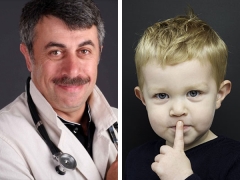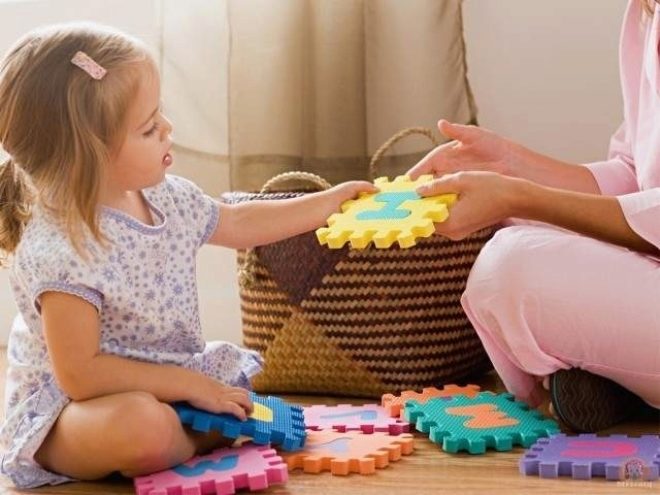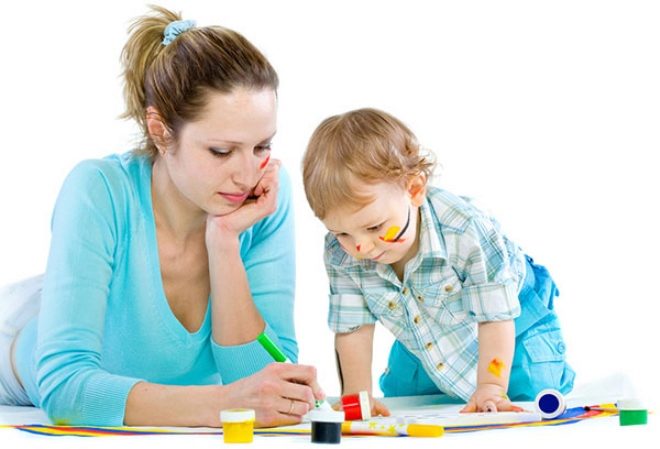Dr. Komarovsky about what to do if the child does not speak at 3 years
Some parents dream that the child is silent for at least five minutes, but the restless person always comments on something. And some mothers and fathers dream that the child said at least something. But the child stubbornly silent.
At 1 year, as a rule, they are just starting to worry about child silence, at 2 years they are already ready to run with a silent child for doctors and psychologists. If the baby does not speak at 3 years, this is a reason for serious anxiety.
A well-known pediatrician Yevgeny Komarovsky helps parents to deal with the terms of the formation of children's speech.
Speech development
If the child does not develop speech, he will not speak. The timing of the beginning of meaningful speaking is a rather individual concept. Some children go from syllables to trying to pronounce words before the year, others are only trying to do it by 2 years.
There are average periods, with a strong lag from which you can suspect a child with speech development delay:
- At 3 months, babies begin to roar;
- In 6-8 months they can babble;
- Girls by the age of 10 months usually pronounce their first word. Boys make it closer to 12 months.
- At 1.5 years old, a child is quite capable of uttering about a dozen words.
- By 2 years he usually knows pronouns, the number of words in the lexicon normally increases rapidly.
- By the age of 3, a healthy, developed baby can easily pronounce about 350 words, freely operate with them, persuade, and express their emotions.
- In 4 years, the vocabulary of the baby is already more than a thousand words;
- In five years, the lexicon doubles, the child knows and speaks more than 3000 words.
The ability to speak without the ability to listen can not exist, and therefore for the development of speech data with a child and with him you need to talk a lot.
Experts advise to begin with the prenatal period - the conversation between the mother and the unborn child benefits both. On late terms of pregnancy the fetus is already well perceived sound vibrations.
After birth, communication with the baby should be continuous. Suppose he does not understand a word of what you say, but he must necessarily listen to human speech a lot and often.
It is very important for babies up to six months to observe the articulation apparatus of mom and dad, by this age he begins to pick up the connection between sound and lip movement. Scarce himself tries to imitate what he hears. First it is a grunt, and then babble.
With proper patience of parents and regular classes based on the repetition of new words, on the connection of words with images, kids learn it with pleasure, their vocabulary increases almost daily.
Even if the baby is not in a hurry to speak independently, with proper development, passive speech should be developed by 2 years. Such a toddler can be asked to perform two consecutive actions - take the object and pass it on to one of the family members.
By three years, usually even poorly speaking children should be able to stand a chain of three consecutive actions based on an understanding of passive speech.
However, this is a theory. In practice, things are not so rosy, and sometimes parents start to worry and ask the doctor about the reasons for the delay in speech development.
Speech delay
If a child is not speaking 1-2 years old, it’s too early to worry, says Yevgeny Komarovsky.
The age at which you need to take seriously the lack of speech is 3 years.At the same time, parents should clearly formulate for themselves and their doctor exactly how the baby is silent: he does not understand adults or does not speak, but he understands everything.
Often the crumb speaks, but adults do not understand him, because he mumbles something incomprehensible, does not memorize the names of objects, calling them in his own way in his own, inaccessible for adults, language.
What to do if the child does not speak, you can find the answer in the next video from Dr. Komarovsky.
Sometimes three-year-old children speak, but are limited to individual words that can not be linked in sentences or even phrases.
After mom and dad describe the essence of the problem as completely as possible, you can begin to look for the causes of the tiny silence.
A delay in speech development in physicians is considered to be a condition in which there is no coherent speech at the age of three. At the same time, the presence of phrasal speech at this age is also considered a deviation from the norm, but not so significant.
According to medical statistics, speech lag is recorded in 7-10% of children aged 3 years, and the boys are much more silent than the girls - there are 4 silence boys for one non-speaking girl.
Reasons for silence
The most basic and most common reason that prevents a three-year-old child from speaking is hearing problems. They can be either congenital or acquired.
Hearing can be reduced slightly or significantly, up to deafness. The baby should be shown to the otolaryngologist. He will conduct a visual examination of the organs of hearing, check the baby’s ability to perceive sounds.
If necessary, a tone audiometry procedure will be assigned, which shows with great precision how good the ear is.
If there are no hearing problems, the parents will have to visit the pediatric neurologist. In some neurological disorders, the speech center suffers, so the doctor will have to find out if the kid has such pathologies. You may have to do an MRI to rule out the possibility of tumors or defects in the structure of the brain.
Komarovsky argues that anomalies and brain diseases are very rarely the cause of speech lag, but this possibility cannot be completely excluded either.
Congenital dumbness - an extremely rare phenomenon in normal hearing, it is based on lesions of the speech apparatus.
If the baby is examined by specialists, and all of them as one claim that the child is completely healthy, there can be pedagogical and psychological reasons for silence.
Sometimes a crumb can refuse to speak after experiencing strong stress, fear, strong fright. Much more often, the reason for silence lies in the incorrect educational approach of mom and dad: if parents in the evenings communicate more with virtual friends on the Internet than with their child who is spinning alongside, then the kid simply has nowhere to get sufficient speech communication skills. In these questions you can contact a child psychologist, a psychiatrist.
Often there are problems with speaking at the age of three. have bilingual children whose families speak two languages at once.
Sometimes the reason for the lack of speech can be mental illness usually congenital (autism, etc.). In 10% of cases of delayed speech development in 3 years, the true cause cannot be established.
If a child in 3 years speaks separate syllables, but does not know how to add words from them, or speaks individual words, but does not bring them together into phrases and sentences, Yevgeny Komarovsky advises visiting neurologist and speech therapist.
And if the kid understands everything, but he answers with completely incomprehensible sets of sounds with preservation of intonations characteristic of normal speech, he requires mandatory Speech therapist consultation.
Dangerous age
There are several age periods when the formation of speech is most intense, and any negative factors can affect the speed of these processes (both to speed up and slow down):
- 6 months. If at this age the child has little communication, then he does not form the need to talk, imitate sounds, babble.
- 1-2 years. At this age, there is an active development of cortical speech zones. Strong stress, frequent illnesses, lack of communication, trauma can lead to a slowing of cortical metamorphosis.
- 3 years. At this age, a coherent speech is formed. Exogenous factors can slow down this process.
- 6-7 years. When exposed to a negative factor at this age, the child is hardly likely to shut up altogether, but violations of speech functions are quite possible (stuttering).
How to teach to speak
If the reason for the delay in speech development is organic (diseases of the hearing, neurological abnormalities, pathologies of the speech apparatus or speech center of the brain), then Komarovsky advises to start with the elimination of this cause.
The child should be given adequate treatment depending on the diagnosis. In parallel with this, the doctor will give recommendations on how to conduct classes for the development of speech.
If the reason for the silence of the child lies in social, pedagogical or psychological problems, you should also eliminate the factors that prevent the baby from expressing his thoughts through speech.
Dr. Komarovsky will talk about how to help your child learn to talk in the next video.
Yevgeny Komarovsky argues that sometimes it is enough to give a three-year-old with an acute shortage of communication in the family in Kindergarten. In the children's team, many boys and girls learn to speak much faster than in the company of adults.
Parents who have decided to develop the speech of a three-year-old child in the absence of diseases that caused silence, should independently prepare for a slow and labor-intensive process. A child psychologist or a child psychotherapist can help them in this, if there is such a specialist in your city. The key to success by 70% lies precisely in the efforts and efforts of parents.
Psychologist tips
Think of your child as an individual, as significant and important as every adult in your family. Talk to him, discuss important issues and daily, household (what to cook for dinner, where to go on a weekend for a walk, etc.). Even if the child doesn’t respond at first, he will begin to form a good habit - to communicate. In parallel with it, the development of internal speech will begin, a better understanding of passive speech.
The parents' oversight can cause a lack of motivation to speak. If a mother asks what kind of apple a baby wants - green or red, and she herself is responsible for it (red, because it tastes better), then the child simply does not have the opportunity to pick words and answer.
If such situations are repeated regularly, then the crumbs become a habit of silence. If this situation repeats yours, change your attitude towards the child and free him from excessive care.
You should not encourage baby talk and babble. If the mother, following the baby, calls the objects around his own language, uses quite a lot of diminutive pet suffixes (typewriter, porridge, daddy, son, etc.), then the child will not form the correct speech function.
Words with such suffixes are much harder to pronounce. Talk to the baby as an adult. He will be pleased and helpful.
Include baby music. Songs, imitation imitations, classical music - all this favorably affects the ability to perceive the world, sounds, speech.
Occupations can be any free minutes. Use every hour you spend with your child. On the way to the store or pharmacy, describe and discuss with him everything that happens on the street: the car is driving - it is red, it is big, the dog is walking - it is small, kind, beautiful.
During cooking, the mother can show the kitchen utensils to the child and call her out loud (spoon, pan), as well as products (apple, carrot, cabbage, walnut).
If there are several children in a family, then, as a rule, it is the younger ones who have problems with speech development. Psychologists believe that this way affects frequent communication with other children, since communication with adults is considered optimal for the development of speech.
Younger kids from large families often just too lazy to talk as it should and in the right amount.
Ask your child more questions. Even if he cannot answer them, do not stop asking. Sooner or later, the son or daughter must respond.
Doctor's advice
- Dr. Komarovsky emphasizes that if a child does not speak more or less coherently in 3 years, this is a clear reason to go to a doctor.
- Evaluating the speech abilities of his child, parents should take into account not only how much and what he is saying at the moment, but also follow the dynamics of speech: if the kid speaks a certain number of words both at 2 and 3, and his vocabulary practically does not increase, Komarovsky calls it a dangerous tendency.
- If at three years the child is behind the standards and knows only a dozen or two words, in a couple of months the lexicon will increase by another ten new words, this is normal. Although the child is lagging behind in standards, he has a positive dynamic in his personal development.
- A child with a speech delay should not be given gadgets for a long time.
- Instead of playing computer games and watching cartoons for a long time, arrange a joint walk, play with your child, read a book to him.
- No need to compare the child with other children. Yours is a unique person, there is no other person, therefore any comparisons are inappropriate.
Forecast
If the parents threw all their efforts to start developing the speech functions of a three-year-old child, attracted specialists to this, the child received treatment if necessary, then the predictions are quite favorable. 85-90% of children fully “catch up” with their peers by 6-7 years.



























